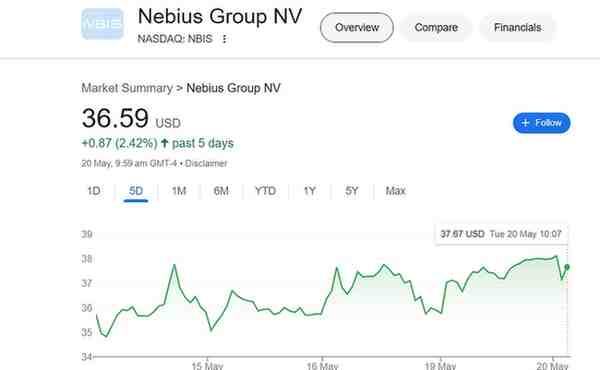In the fast-paced world of Wall Street, a new ticker symbol is making the rounds – NBIS. If you keep track of trending stocks or Reddit’s r/WallStreetBets, chances are you’ve seen NBIS more than once. But what exactly is NBIS, and why is it suddenly garnering so much attention? Should investors be interested?
Let’s break it down for the average investor looking to make informed decisions.
What is NBIS?
NBIS stands for New York Bank of Investments and Savings, a relatively new financial institution that aims to change the traditional banking model. Although it is not as big as JP Morgan or Bank of America, NBIS is making its mark by focusing on digital-first banking, small business lending, and financial services for underbanked communities. This is greatly benefiting small investors.
Founded in 2021 and headquartered in Manhattan, NBIS recently went public, listing on the NASDAQ under the ticker NBIS in early 2025. Since then, the stock has become a topic of discussion in both traditional finance media and online investing communities.
NBIS Stock Performance
Since its IPO, NBIS stock has experienced notable volatility. The IPO price was set at $14, and the stock surged to nearly $28 within the first two weeks of trading. However, as of mid-May 2025, it has corrected and is currently trading around $19-$21 per share.
This type of price movement is not unusual for IPOs, especially in the banking sector where market confidence and regulatory sentiment can heavily influence price.
Why is NBIS Trending?
Several factors are driving interest in NBIS stock:
1. Disruptive Business Model
NBIS focuses on online-only banking, AI-driven underwriting for loans, and crypto-backed savings accounts. These tech-forward offerings appeal to younger, tech-savvy investors.
2. Undervalued Small-Cap Play
Many retail investors see NBIS as an undervalued stock with long-term growth potential, especially as digital banking continues to expand in the U.S.
3. Speculative Buzz
Influencers and traders on platforms like X (formerly Twitter) and Reddit have hyped NBIS as the “next big fintech breakout,” pushing up short-term volume.
4. Earnings Report Ahead
The company is set to release its first quarterly earnings report as a public company later this month, which could be a major catalyst for the stock.
Risks to Consider
Before jumping on the NBIS train, investors should weigh the risks:
- Low Liquidity: As a recent IPO with a small market cap, NBIS can see big price swings with relatively little volume.
- Regulatory Oversight: NBIS’s unique financial products, especially those tied to crypto, could face future regulatory hurdles.
- Unproven Track Record: With only a few years in business and no prior earnings history, it’s hard to predict how NBIS will perform long-term.
Analyst Sentiment
So far, Wall Street analysts are mixed. Some firms have given NBIS a “Hold” rating, citing its strong vision but limited operating history. A few tech-focused hedge funds have reportedly taken small positions, betting on its future innovation.
Should You Invest in NBIS?
NBIS stock represents a high-risk, high-reward opportunity. It’s ideal for investors who are:
✅ Comfortable with volatility
✅ Interested in fintech and innovation
✅ Looking for early exposure to small-cap digital banking stocks
But if you prefer stable blue-chip stocks and long-term dividends, NBIS might not be the right fit — at least not yet.
Final Thoughts
NBIS is one of those interesting stocks that could either become a fintech success story or perish under the pressure of regulation and competition. The next few quarters – especially the upcoming earnings release – will be crucial.
If you want to invest in them, then it is okay but do your research first and then invest because you cannot invest in any company based on the news alone.
As always, do your own research, diversify your portfolio, and never invest money you can’t afford to lose.
Disclaimer: This article is for informational purposes only and does not constitute financial advice. Always consult with a financial advisor before making investment decisions.


